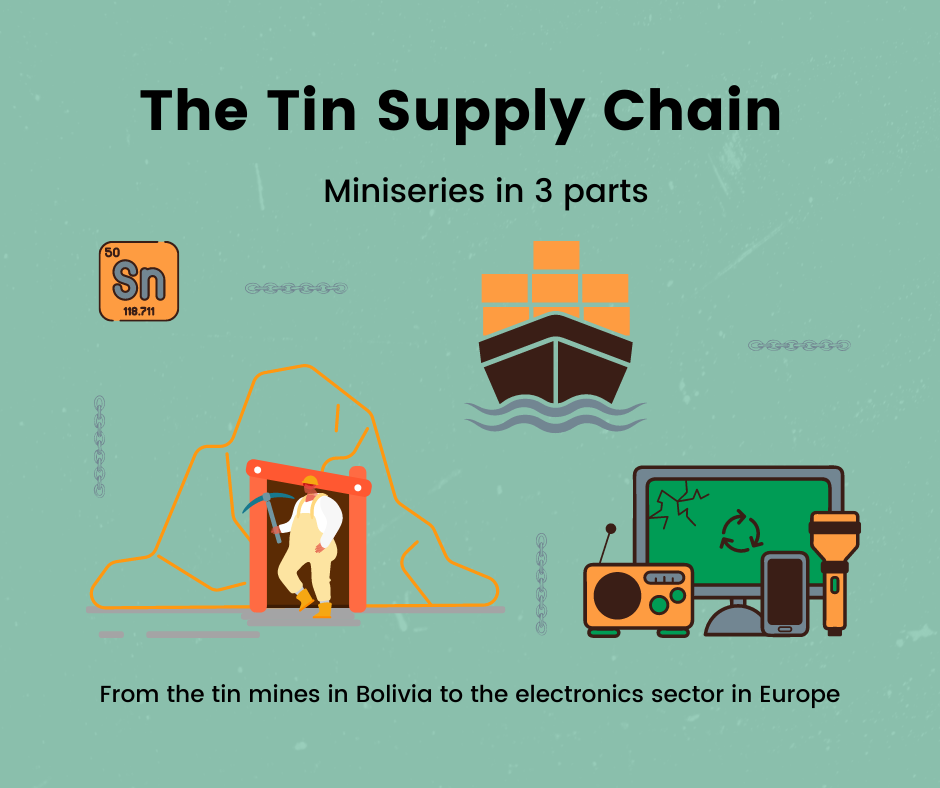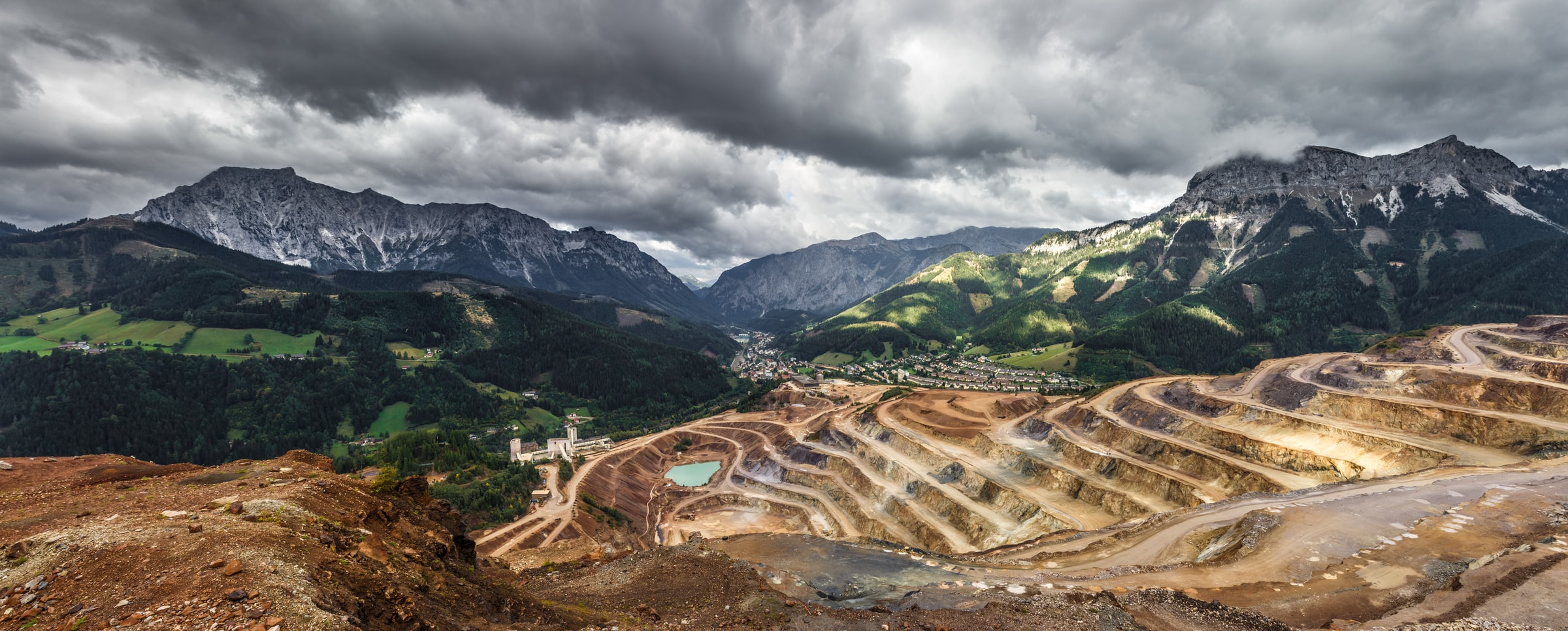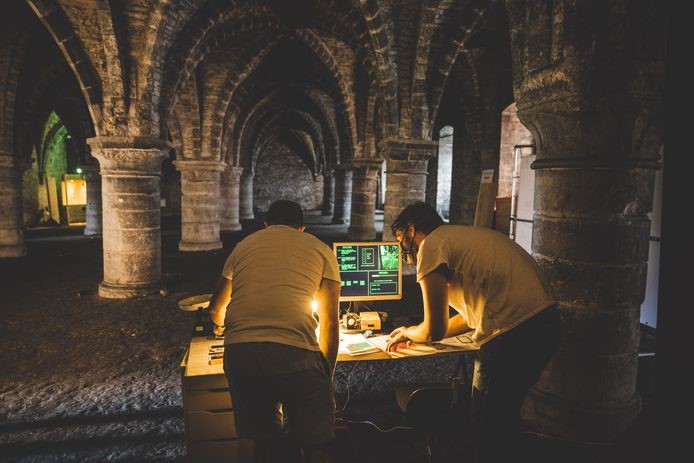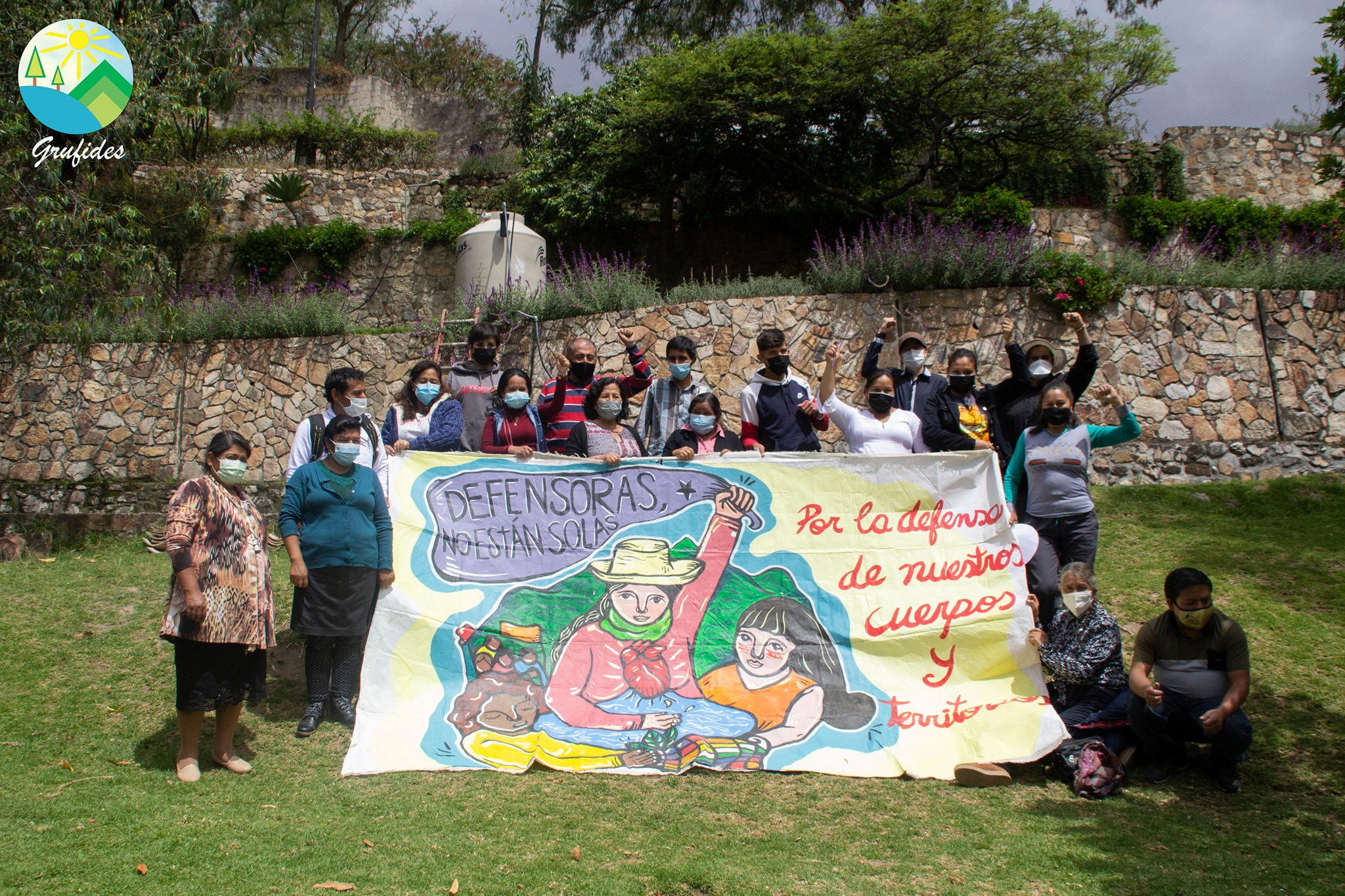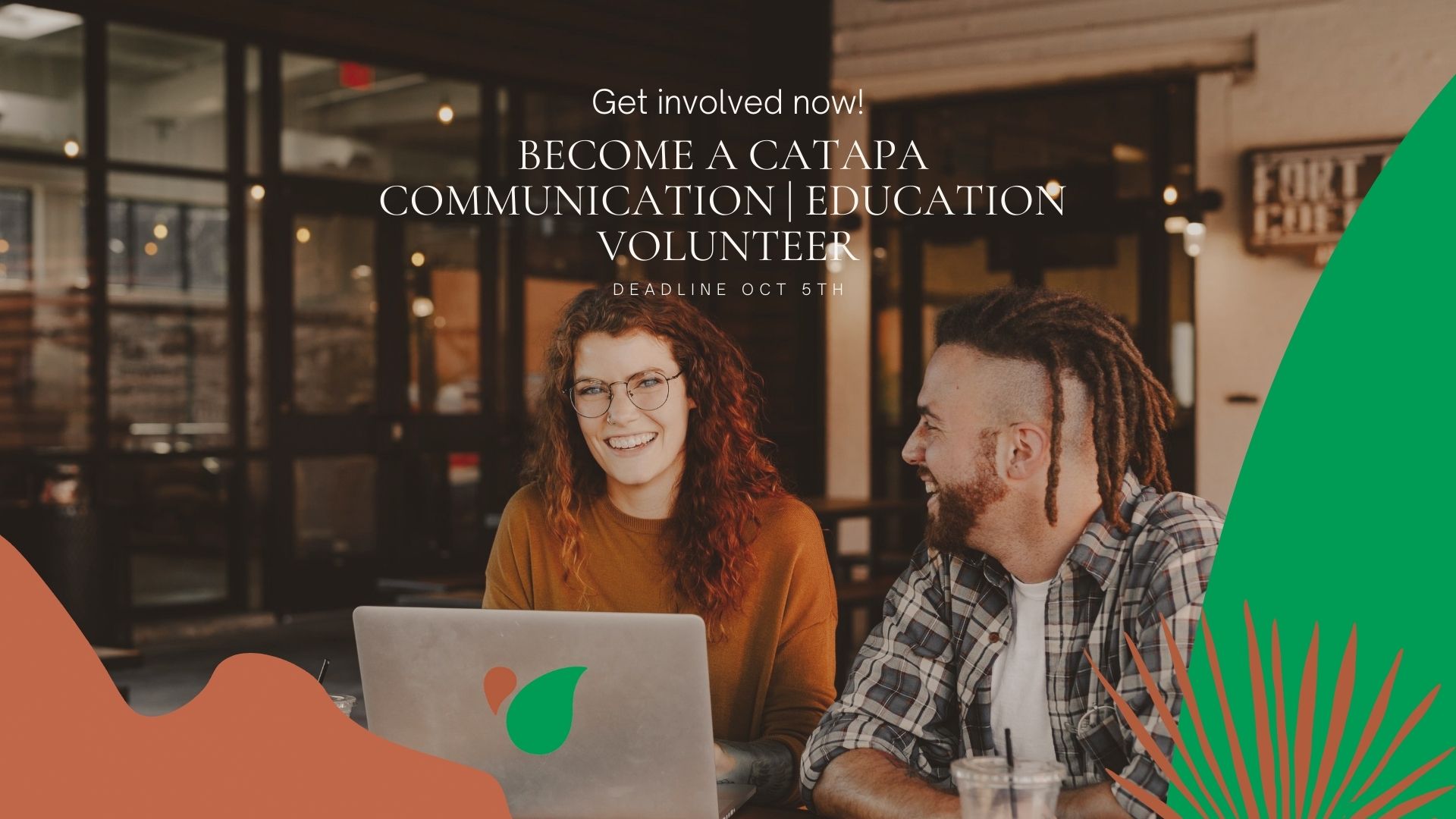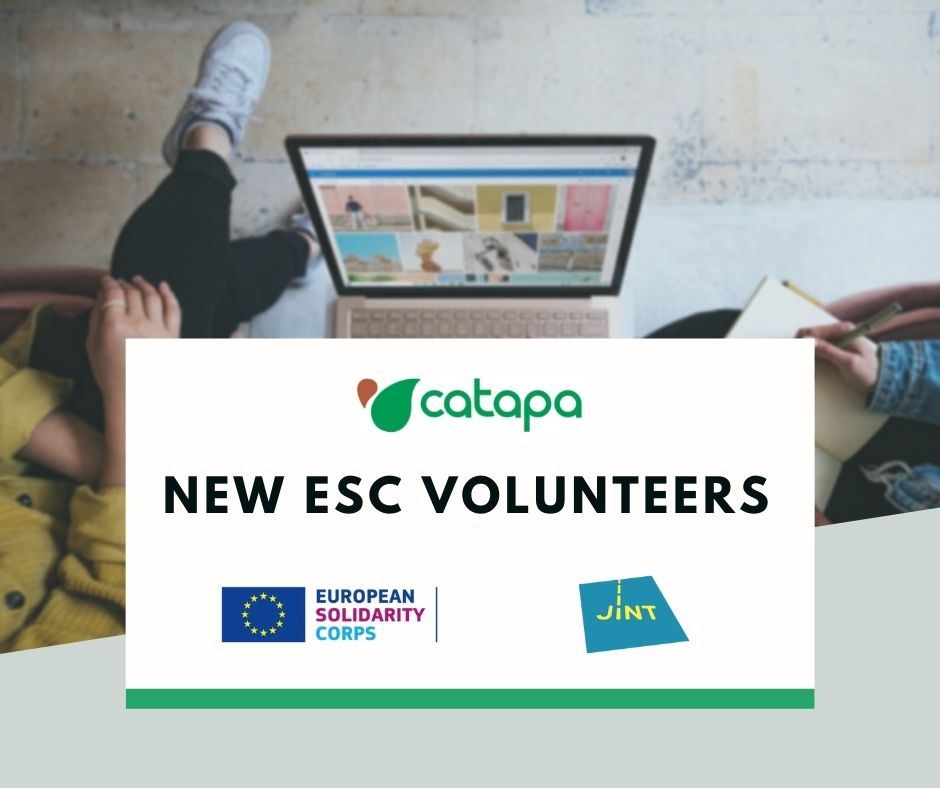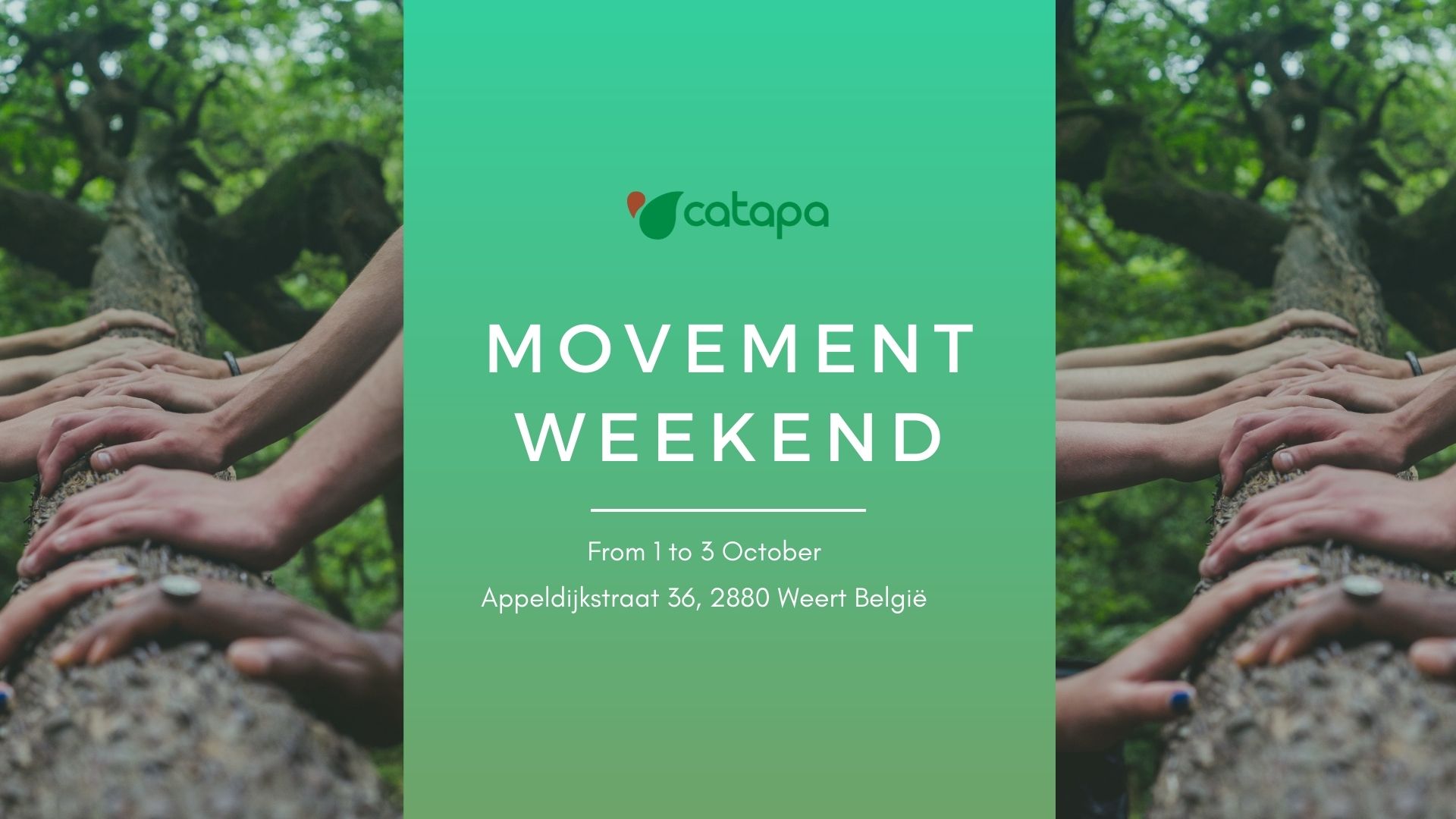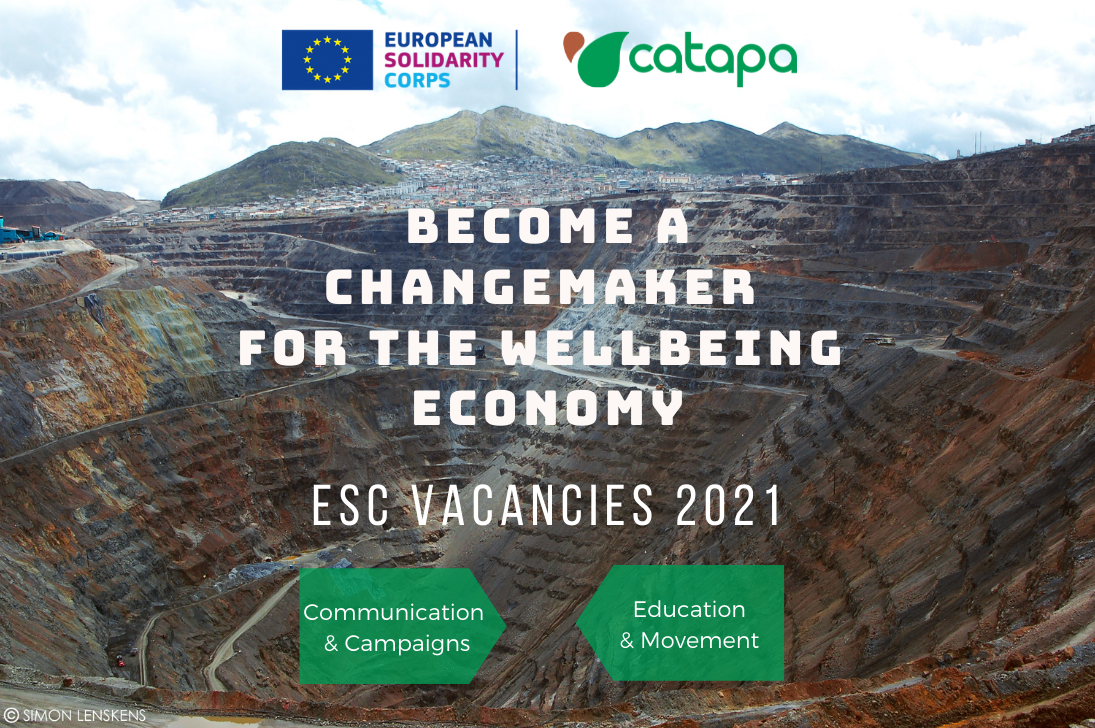The Tin Supply Chain Miniseries, Part I
Monitoring of the Tin Mines in Bolivia
Since autumn 2020, CATAPA vzw has been partnering up with Electronics Watch – an independent monitoring organisation with experts in human rights and global supply chains – and CISEP – Centro de Investigación y Servico Popular, a local Bolivian non-profit organization – to start monitoring tin mining cooperatives in the department of Oruro, Bolivia. This project was funded by Bread for All (BfA). This work is part of a bigger project organised by CATAPA’s Bolivia Working Group: investigating the tin supply chain, from raw material to end product.
Today we are presenting the first part of this research focussed on important findings related to working conditions and human rights (violations) in the Bolivian tin mines. Later on we will also present the findings related to the Bolivian smelters, the import of tin into the EU and the presence of tin in the electronics sector.
Most important findings of the monitoring of the miners

The interviews with the miners of the cooperatives indicate that:
- Miners sometimes have to work below 70m depth (related issues: less oxygen, lung diseases, silicosis) without personal protection
- Wages are calculated daily, but can become more fixed after time (depending on goodwill of the chief)
- Cooperative miners are paid based on the amount of mineral extracted, wage levels are very untransparent (often only 1% of the gross value of production, which is very low)
- The miners work long hours, mostly 6 days a week. Some work 12 to 16 hours a day
- There is large inequality between male and female workers: females are being paid much less because they mostly get jobs outside of the mining galleries (as it is believed bad luck for women to enter the mines) where they search for value among discarded ore
- Occupational safety and health prevention systems are almost non-existent
- There is no access to drinking water in the workplace
More details about the results and the background of the monitoring project can be found further down this page.

Conclusions and future steps
Legally it seems that the Bolivian national laws are not being violated, but rather circumvented, as cooperative workers are legally themselves their own employers. CISEP and Electronics Watch are planning to continue working on this project, ultimately aiming to contribute to improved wages and health and safety conditions for the workers. The next steps, amongst others, will include training the cooperative miners on the importance of prevention and the use of protective equipment.
This is PART I of our miniseries about the monitoring of the tin supply chain. Once the tin ore is extracted, what happens with it? Stay tuned for part II and III: the findings about the Bolivian smelters and under which circumstances tin is imported into the EU and later on, how and when it ends up in the electronics sector.

More details and background of the monitoring project in the tin mines
20 surveys and 13 interviews were conducted between May and September 2021. Note that the majority of the interviewed cooperative mining workers were male, less than 28 years old and of Quechua origin. This profile is also the most common one, although some females also work there, and some of them have also been interviewed. The surveys and interviews have taken place in the workplace or at site, lasting approximately 30 minutes up to 1 or 2 hours. They were asked mainly about the following topics: form of income, remuneration, health and safety, possible forms of harassment at work (also in terms of gender), production and working hours.
Also important to know: the main part of the monitoring took place during the Corona pandemic, which prevented a more constant and continuous monitoring because people outside the exploitation had reduced presence in the mining camp. The research might also have been limited by the fear of some of the interviewees to address certain topics like for example environmental issues.
Actually most of the workers are self-employed. This means that miners are not provided with protective and technical equipment or occupational health and safety, which … makes their work dangerous and unhealthy.
The mining cooperatives
The cooperative system is in practice a system of labour “flexibility” in Bolivia, which reduces labour costs within the internal supply chain. Although the cooperative law states that they are obliged to comply with the social laws (such as the general labour law), this applies only when there is an employee/employer relationship.
The cooperative system is in practice a system of labour “flexibility” in Bolivia, which reduces labour costs within the internal supply chain. Although the cooperative law states that they are obliged to comply with the social laws (such as the general labour law), this applies only when there is an employee/employer relationship.
In reality, mostly this is not the case: the cooperative structure is restricted to being a collective management organization for the purchase and sale of minerals, the administration of social security and the access to metal-rich sites owned by the state. So actually most of the workers inside the cooperative mining area are self-employed as cooperative members (employer-and-employee).
The consequences of this self-employment are that miners are not provided with protective and technical equipment or occupational health and safety, which, together with the lack of protective systems in the workplace, makes their work dangerous and unhealthy. The miners’ teams have to provide their own personal protection equipment: they buy their work tools, they pay for the use of the concentration plant and the machinery, they pay for basic services and for the administrative services provided by the cooperative management.
Also investments in new technology are very limited and maintenance services are practically nonexistent, although there is a mechanical workshop to replace parts of essential equipment. On top of that, equal remuneration among all members is not guaranteed due to this management model of the mining cooperative system in Bolivia.
Labour contracts for apprentices
The people who work in the concentration plant (instead of those inside the galleries) are paid a basic national salary: approximately US$300, although it is not sure if this coincides with the minimum necessary to live, since according to the interviewees the cost of living is approximately US$430. Regardless of this, the cooperative does not even apply the calculation of a minimum wage for all their employees, only to cooperative members who can’t work inside the mine due to their temporal obligation in specific functions (Directors or Supervisory boards) and the possible future associated workers who are working on trial.
On the one hand there is no guarantee that the wages received cover the minimum needs, nor is there any control that the hours per week are less than 48 hours, since the cooperative does not act as an employer, but rather as an administrative manager of the self-employment of its members.
There is also a large inequality between cooperative members and non-cooperative probationary workers (there is a minimum 1 year of external work before getting offered to become a member of the mining cooperative) . If you work under this “apprentice” system,you receive this national minimum wage for 8 hours of work, but you do not receive an increase for overtime or for working on Sunday or holiday, and it is not possible to verify if health insurance is paid by the cooperative.
It is also possible that there are infractions with the apprentice contracts and that there is an unofficial system of labor harassment by the cooperative members during the probationary year. On the positive side, the working hours of the probation workers are controlled and regulated, while the cooperative members work in a system of self-exploitation.
The miners’ income depends entirely on luck: either they find enough metal-rich ores or they don’t.*
Wages for these workers are calculated daily. They can become more fixed after some first trial time, but this depends on the goodwill of the person in charge of that new worker. Miners are paid based on the amount of mineral they extract, so the miners’ income depends entirely on luck: either they find enough metal-rich ores or they don’t*. Also the income levels are very untransparent: often it is around 1% of the gross value of the production in the international market, which is very low.
Payment insecurity and overtime
There is no transparent system that ensures equal remuneration amongst the cooperative workers, mainly when the production is delivered to the concentration plant on behalf of the leader of a miners crew. This leader is supposed to distribute the value equally among his/her crew, but here there is no evidence that this happens without discrimination. The crew system has another downside: because the crews are self-managed, the mechanisms for conflict resolution are dealt with within the crew. Only when cases are serious (which is also subjective), they go to the management or Supervisory Council, one of the two official upper organs in the cooperatives, together with the Board of Directors.
Working hours are extremely long for (potential) affiliates and there is a risk of involuntary overtime for all: because there is no control over work schedules there is a danger of overwork and overtime.
They mostly work 6 days a week. According to the survey 91% say that they have worked 7 days a week at some time … 33% say they work 10 hours and 16% say they work 12 hours a day. Since no one controls whether workers are working beyond their own strength, working hours could be lasting even longer than 16 hours.
Some of them argue that given the high price of minerals, they have been working sometimes 16 and 24 hours continuously, because of “their own will”. But since this “will” is linked to generating more income, you could argue that it is not necessarily “their own will”, but “forced” out of necessity. In the survey, 1 person said that they do not work voluntarily but that necessity forces them to do so.
Apparently there is also a recent obligation to work at least 15 days/month (this obligation is linked to the quota from the agreement they have with the local trading company that purchases their ore), and if they do not do so, they are sanctioned.
Next to these inconsistencies, there is large inequality between male and female workers. Women are paid much less. 50% of respondents indicate that women and men are not treated equally in the workplace. Women mostly get jobs outside of the mining galleries, as it is believed bad luck for women to enter the mines.
The women involved in Oruro’s cooperative mining activities are usually elderly widows who lost their husbands in the mines or in related activities, either young girls or single mothers with children. Active participation is limited for them, as it is traditionally believed that their presence inside the mine brings bad luck. Therefore, they mainly work outside, breaking up discarded ore blocks looking for mineral rests, or working in other fields with fewer opportunities to earn a living. In the sales process, it is mainly the women who are cheated and receive an unfair price. Many women work on an informal basis, even outside the framework of the cooperative, so they lack health insurance or a pension fund. In addition, they generally take care of the family and therefore almost always bear a double burden.*

Working Conditions: Health & Safety
The interviews that were conducted indicate that miners sometimes work without personal protection, even when working below 70m depth, since that lowest level is being exploited by the cooperative as a whole. It is part of the collective contribution for the cooperative, out of their traditional mining-crew system. They have to help with the common costs of the cooperative by putting their own work at least 3 days a month in this new deep gallery. So it is not only unsafe and unhealthy to work there, but they also feel forced by the cooperative management to work there as an extra, because while those days are paid, the members are required to work inside the mine besides the days they already had to work with their crew to provide for their own income.
That depth is critical because there is less O2 and higher risks for lung diseases and silicosis, among others. They have to work there a minimum of 3 times a month: if they miss 2 times they are penalized and if they miss a 3rd time they lose their affiliation paper (the certificate of contribution to the cooperative) and they have to leave the cooperative. This level is accessed by an elevator system without emergency exit systems.
The interviewees imply that there is no safety plan in place and that occupational safety and health prevention systems are almost non-existent, probably due to the lack of resources from the management. On the contrary there are safety and health officers, but their functions are related to managing accidents and subsequent events, not preventing them!
A physical check shows that the concentration plants are constructions that are more than 50 years old and that there is no proper signage and ventilation. In general there are almost no risk and hazard signs inside the mine, or they are in constant deterioration and there is no plan for replacement of these signs.
The work inside the mine is excessively cold and humid. There is no access to drinking water in the workplace.They mention that each worker takes his/her own water for daily work. More than 75% of the respondents say they have to stand continuously, sometimes up to 6 or even 12 hours. 3/4 also note that they are exposed to strong vibrations due to rock drilling and blasting and that they have to use heavy machinery.
The drilling of the rock inside the mine is not controlled: it should be done with water to avoid the formation of mineral dust suspended in the air, but there is no water system that reaches all the sites due to the investment cost involved. 74% claim to be exposed to gases and dust from rock blasting.


Because of these circumstances some miners have developed silicosis (a form of occupational lung disease caused by the inhalation of dust** due to the lack of water in the mining drilling process), rheumatism (due to excess humidity inside the mine) and head tumors (because of sliding rocks inside the mine, due to a lack of reinforcement of gallery infrastructure).
91% say that chemicals are not handled properly and more than 83% claim that there is continuous exposure to unprotected toxic materials such as xanthate and arsenic and that they have been exposed to fumes from the underground, for example those generated by diesel minecarts. The lack of ventilation systems generates a lot of combustion smoke that, according to one interviewees, affects mainly the “older” miners.
66% of the miners complain about occupational safety issues. Since everyone buys their own personal protective equipment, there is no industrial safety and it is not ensured. In the description of personal protective equipment, all describe the use of hearing protectors, respirators (but without a continuous change of filters and limited to the drilling of the rock) and head and feet protection, but no one has spoken about the use of back protectors. This is especially important because the minecarts are only present in the main galleries and from the undercuts they have to move the ore on their back in backpacks or sacks that carry a weight of about 40 kilos. There is evidence that they have to make walks of up to 30 minutes with this weight on top of them.
Within the mines there are no toilets or excreta disposal systems, therefore it is not allowed to relieve themselves inside the mine, for this they should wait for the change of shifts (7-13, 14-19).
On top of this the miners do not have clear and visible information about their rights within the cooperative: they do not receive an introduction, they lack information about their health insurance and they are poorly treated by the public health system, they are not trained in the handling of tools nor do they receive postural education, they are not taught to use personal protective equipment and so on.
Stay tuned for part II of our miniseries
This is PART I of our miniseries about the monitoring of the tin supply chain. What happens once the tin is extracted? Stay tuned for the findings about the Bolivian smelters and under which circumstances tin is imported into the EU and later on, how and when it ends up in the electronics sector.
References:
- ORURO_Data_Report_171021
- * Towards a fairer ICT supply chain – Bolivia’s Case
- ** Wikipedia Silicosis
- Pictures: CISEP – Centro de Investigación y Servico Popular




